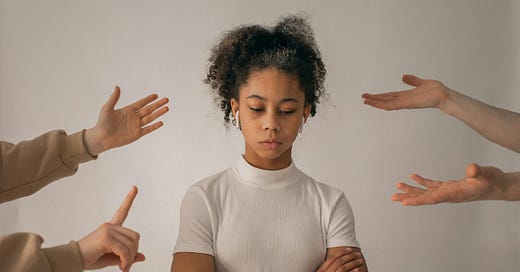Your journal prompts this week:
When was a time I disappointed someone, and how did they express this disappointment to me?
How did I feel, knowing I had disappointed someone, and what did I learn from that experience?
How has someone else's disappointment or expectations of me reinforced my people pleasing tendencies?
How would I like to respond to other people's feelings of disappointment in the future?
Note: This is part two of a three-part series on people pleasing.
This week I want to chip away at another layer of the need to people please, and this layer is all around the desire to avoid disappointment.
Remember growing up, when an adult's favorite thing to say when you did something wrong was, "I'm not mad, I'm just disappointed," with the goal of making you feel so ashamed you'd never make them mad or do something they didn't like again?
And this wasn't limited to just our parents or teachers, the adults we saw every day. I still remember one strange moment in middle school when a random man in a movie theatre told me he was disappointed in me.
I briefly hung out with a crowd of not-so-good kids in eighth grade, and I went to the movies with them. These girls were all dating older boys who were freshmen, and they set me up with one of them, who, of course, turned out to be a terrible match for me. But I felt like I was finally on the cusp of fitting in, so I went along with it for as long as I could.
The freshmen boys in this group were loud and rude and goofing off through the whole movie. They'd brought in fast food from outside the theatre, and when they were done eating, they started throwing it all around. I was so anxious about all the noise they were making that I could barely watch the movie. The couple behind us got annoyed, and I saw the guy get up and leave. I thought for sure he was going to tell on us, and we'd get kicked out, but no one came. I wanted to seem cool, so I of course didn't say anything to get the boys to stop.
Eventually the three or so of us girls got up as a group to go to the bathroom. On our way out, I saw the man who had been sitting behind us standing at the back of the theatre, his arms crossed, watching the movie from there. Again, I thought for sure he had told on us and was just waiting for an usher to come in so he could point him in the right direction.
We went to the bathroom, and on our way back into the theatre, we had to pass the man again. This time, he reached out and grabbed me by the arm to stop me. The other girls kept going ahead of me, not knowing I had been stopped. In a harsh whisper into my ear, he told me our group was ruining the movie experience for him and everyone else, and he had to stand in the back just to hear the movie. He said he was “very disappointed" in me and then let go of my arm.
I felt so much shame in that moment—and also a little scared because an older man in a theatre had grabbed me by the arm in the dark. I still wonder exactly why he picked me out of all of us girls to say this to. Maybe I looked like the weak link, the one who was embarrassed and therefore most likely to do what he wanted. Or maybe I was just the most convenient target because I walked into the theatre last.
But regardless of his reason, there I found myself again, guilty by association—just as I was at home whenever my brother didn't do his chores and I did, yet I still got yelled at too. It turned out I was not only responsible for making sure I alone pleased others, but I was also responsible for making sure that the others around me did so too. And this felt like a big ask for a timid teen.
Somehow, we didn't get kicked out of that movie, but I don't remember if we stayed to watch the whole thing. I remember being in the parking lot of the theatre afterward, where the boys found an abandoned shopping cart and wildly pushed themselves around in it. I was embarrassed and uncomfortable the whole time, proving again how much of a goody-two-shoes I was. Needless to say, my time with that group did not last long, but the guilt I felt did.
In the months after that incident at the movie theatre, I would sometimes remember that man who grabbed me and get angry about it. Why didn't he just tell on us, why did he have to single me out when I wasn't even the one making all the noise? And who was he to be so "disappointed" in me? I wasn't his child! I didn't even know him! I didn't owe him anything! I'd imagine what I would've said to him if I hadn't been so taken by surprise. I would've screamed at him not to touch me, for one. But I think what really troubled me the most was that in that moment, I just completely froze. I did nothing so as not to further displease anyone—my "friends" or this random stranger.
Perhaps the bulk of the guilt I felt over this incident really stemmed from the guilt I had in betraying myself. I was focused purely on keeping everyone around me happy. I was unable to assess what I really wanted to in that moment—to watch the movie or not, to stand up to the stranger or not. I just wanted to keep the peace, if at all possible, and ignore my own feelings in the process.
When I look back on how much time I've spent avoiding triggering other people's disappointment, I realize that letting go of people pleasing is really just one big lesson in learning how to be okay with disappointing people. When I set a boundary to protect my own peace, when I say no to something someone else wants me to do, they are going to be disappointed. But the management of their own disappointment and their own emotions is their responsibility—not mine. It's not my job to protect others from feeling disappointment.
Disappointing people is inevitable, especially when you're actually taking care of yourself and your own dreams. In that case, the fact that I'm disappointing people now, as an adult, is a good sign—not a bad one to be ashamed off. And even as a child, it's a good thing to do every so often because we learn to stand up for ourselves and our own needs. Instead of learning to do that as a kid, I'm having to teach that to myself as an adult.
And it would probably behove us all to witness the next time we feel someone disappointed us, and to remember that we created our own expectations for this person. It is ultimately our responsibility to manage our own emotions around that disappointment. I think this is how we can all heal.
Explore your experience with disappointing people, and how it contributes to any of your people-pleasing tendencies, with the journal prompts above.
While journaling is a solo practice, I want this to be a place for love and support. So, as always, please feel free to share your insights in the comments below. And if you ever feel the need for additional guidance and would like me to pull a Tarot or Oracle card for you, let me know in the comments, and I’ll respond with a card and message just for you.
With much love and gratitude,
Marcy















Share this post